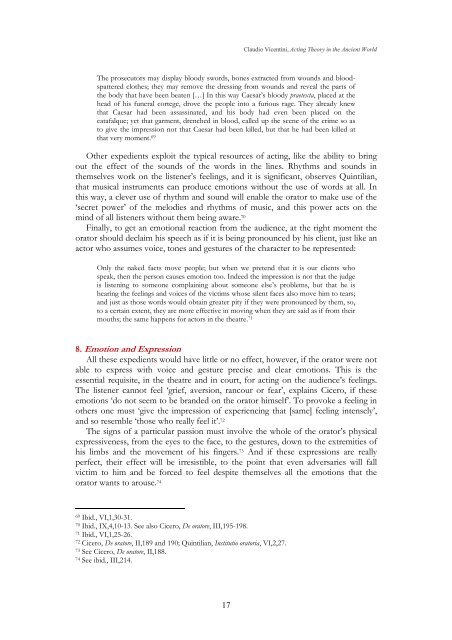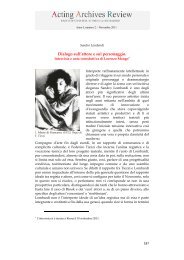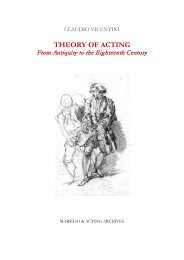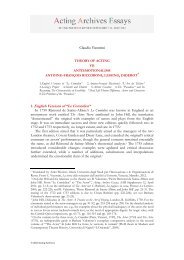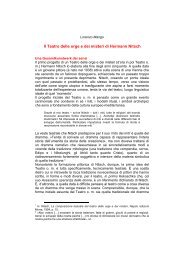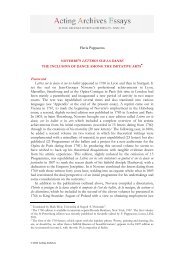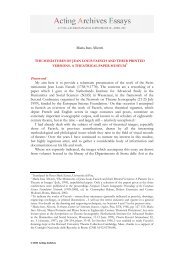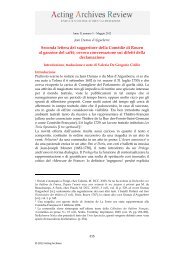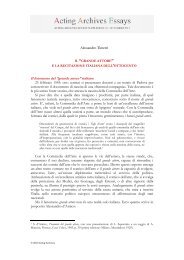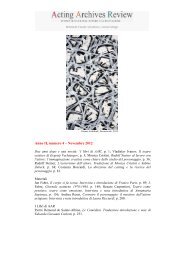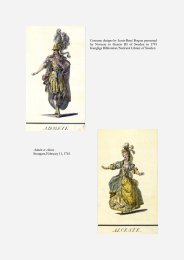AAR <strong>Act<strong>in</strong>g</strong> <strong>Archives</strong> Essays Supplement 1 – April 2011And so <strong>the</strong> orator had to make use of emotional effects <strong>in</strong> carefully calculatedquantities dur<strong>in</strong>g his oration. He would use <strong>the</strong>m cautiously at <strong>the</strong> outset, briefly <strong>in</strong><strong>the</strong> next part of his speech, com<strong>in</strong>g to a climax at <strong>the</strong> end, leav<strong>in</strong>g audience andjudges wholly <strong>in</strong> <strong>the</strong> grip of <strong>the</strong> feel<strong>in</strong>gs evoked, just as <strong>in</strong> <strong>the</strong>atrical performances:‘<strong>the</strong> <strong>the</strong>atre’, claimed Qu<strong>in</strong>tilian, ‘should be stirred at <strong>the</strong> moment <strong>in</strong> which <strong>the</strong>ancient tragedies and comedies close to <strong>the</strong> sound of applause’. 66This was because <strong>the</strong> emotions that were so carefully produced might disturb <strong>the</strong>judge’s rational faculties, not only <strong>in</strong>fluenc<strong>in</strong>g his op<strong>in</strong>ion, but actually compromis<strong>in</strong>ghis ability to rigorously evaluate arguments, facts and witness statements:Let us admit that <strong>the</strong> evidence makes <strong>the</strong> judges believe that our case is better: <strong>the</strong>irfeel<strong>in</strong>gs <strong>in</strong>duce <strong>the</strong>m actually to want it to be so; but what <strong>the</strong>y want, <strong>the</strong>y also believe.When <strong>the</strong>y have started to feel anger, support one side, feel hatred or pity, <strong>the</strong>y nowth<strong>in</strong>k that it is someth<strong>in</strong>g that concerns <strong>the</strong>m, and as lovers can no longer judge beauty,so <strong>the</strong> judge <strong>in</strong> <strong>the</strong> grip of feel<strong>in</strong>gs completely loses his ability to verify <strong>the</strong> truth. He isswept along by <strong>the</strong> tide of passion, and yields himself up to <strong>the</strong> torrent. 67Thus <strong>the</strong> emotional impact causes <strong>the</strong> judge to identify with one of <strong>the</strong> parties to<strong>the</strong> case until he th<strong>in</strong>ks that it is someth<strong>in</strong>g that concerns him, just as a member of<strong>the</strong> audience normally sympathizes with <strong>the</strong> hero of a play. Carry<strong>in</strong>g all before himwith <strong>the</strong> flood tide of feel<strong>in</strong>gs, <strong>the</strong> orator manages to blur his perception of reality.Just as on <strong>the</strong> stage, <strong>the</strong> real facts lose <strong>the</strong>ir objective contours and are shapedaccord<strong>in</strong>g to people’s subjective feel<strong>in</strong>gs. An image of <strong>the</strong> world constructedaccord<strong>in</strong>g to <strong>the</strong> rigorous parameters of <strong>the</strong> <strong>in</strong>tellect and adherence to reality isreplaced by a vision called up by feel<strong>in</strong>g.But command<strong>in</strong>g <strong>the</strong> emotional reactions of <strong>the</strong> audience is not easy. To succeed,<strong>the</strong> orator, like <strong>the</strong> actor, must make use of a number of tools relat<strong>in</strong>g to <strong>the</strong> form of<strong>the</strong> text to be spoken and what <strong>in</strong> <strong>the</strong>atrical term<strong>in</strong>ology we might call its production,as well as everyth<strong>in</strong>g connected with <strong>the</strong> specific resources of act<strong>in</strong>g.As regards <strong>the</strong> form of <strong>the</strong> text, <strong>the</strong> story and <strong>the</strong> l<strong>in</strong>es of a tragedy are studied toattract <strong>the</strong> attention and feel<strong>in</strong>gs of <strong>the</strong> audience. In <strong>the</strong> same way, <strong>in</strong> <strong>the</strong> orator’sspeech all <strong>the</strong> events described must assume a precise emotional colour<strong>in</strong>g, andQu<strong>in</strong>tilian gives several examples of this. To horrify <strong>the</strong> judge, <strong>the</strong> orator must make<strong>the</strong> crime to be condemned seem particularly odious. If it is an assault he willunderl<strong>in</strong>e its atrocity, recall<strong>in</strong>g that <strong>the</strong> victim is an old man or a young boy, or amagistrate, or an honest man. He will recall that <strong>the</strong> fact happened at a dangerousmoment for public safety, when ‘most of <strong>the</strong> trials be<strong>in</strong>g held are for acts of thisk<strong>in</strong>d’. Or, to arouse compassion, <strong>the</strong> orator will dwell on <strong>the</strong> victim’s condition and<strong>the</strong> sad future his children and his parents can expect, describ<strong>in</strong>g <strong>the</strong> fate of thosewho have sued for violent attacks when <strong>the</strong>y do not obta<strong>in</strong> justice: ‘<strong>the</strong>y have to flee<strong>the</strong> city, give up <strong>the</strong>ir goods, put up with all manner of harassment from <strong>the</strong>ir enemy’and so on. 68Then <strong>the</strong>re are <strong>the</strong> expedients on <strong>the</strong> ‘production’ side. These are particularlyspectacular and are actions <strong>the</strong> orator can perform, display<strong>in</strong>g to <strong>the</strong> audience figuresand objects, with effects like a chamber of horrors:66 Qu<strong>in</strong>tilian, Institutio oratoria, VI,1,51 and 52. See also IV,2,27 and 28, and VI,1,9-10.67 Ibid., VI,2,5-6.68 Ibid., VI,1,15-19.16
<strong>Claudio</strong> <strong>Vicent<strong>in</strong>i</strong>, <strong>Act<strong>in</strong>g</strong> <strong>Theory</strong> <strong>in</strong> <strong>the</strong> <strong>Ancient</strong> <strong>World</strong>The prosecutors may display bloody swords, bones extracted from wounds and bloodspatteredclo<strong>the</strong>s; <strong>the</strong>y may remove <strong>the</strong> dress<strong>in</strong>g from wounds and reveal <strong>the</strong> parts of<strong>the</strong> body that have been beaten […] In this way Caesar’s bloody praetexta, placed at <strong>the</strong>head of his funeral cortege, drove <strong>the</strong> people <strong>in</strong>to a furious rage. They already knewthat Caesar had been assass<strong>in</strong>ated, and his body had even been placed on <strong>the</strong>catafalque; yet that garment, drenched <strong>in</strong> blood, called up <strong>the</strong> scene of <strong>the</strong> crime so asto give <strong>the</strong> impression not that Caesar had been killed, but that he had been killed atthat very moment. 69O<strong>the</strong>r expedients exploit <strong>the</strong> typical resources of act<strong>in</strong>g, like <strong>the</strong> ability to br<strong>in</strong>gout <strong>the</strong> effect of <strong>the</strong> sounds of <strong>the</strong> words <strong>in</strong> <strong>the</strong> l<strong>in</strong>es. Rhythms and sounds <strong>in</strong><strong>the</strong>mselves work on <strong>the</strong> listener’s feel<strong>in</strong>gs, and it is significant, observes Qu<strong>in</strong>tilian,that musical <strong>in</strong>struments can produce emotions without <strong>the</strong> use of words at all. Inthis way, a clever use of rhythm and sound will enable <strong>the</strong> orator to make use of <strong>the</strong>‘secret power’ of <strong>the</strong> melodies and rhythms of music, and this power acts on <strong>the</strong>m<strong>in</strong>d of all listeners without <strong>the</strong>m be<strong>in</strong>g aware. 70F<strong>in</strong>ally, to get an emotional reaction from <strong>the</strong> audience, at <strong>the</strong> right moment <strong>the</strong>orator should declaim his speech as if it is be<strong>in</strong>g pronounced by his client, just like anactor who assumes voice, tones and gestures of <strong>the</strong> character to be represented:Only <strong>the</strong> naked facts move people; but when we pretend that it is our clients whospeak, <strong>the</strong>n <strong>the</strong> person causes emotion too. Indeed <strong>the</strong> impression is not that <strong>the</strong> judgeis listen<strong>in</strong>g to someone compla<strong>in</strong><strong>in</strong>g about someone else’s problems, but that he ishear<strong>in</strong>g <strong>the</strong> feel<strong>in</strong>gs and voices of <strong>the</strong> victims whose silent faces also move him to tears;and just as those words would obta<strong>in</strong> greater pity if <strong>the</strong>y were pronounced by <strong>the</strong>m, so,to a certa<strong>in</strong> extent, <strong>the</strong>y are more effective <strong>in</strong> mov<strong>in</strong>g when <strong>the</strong>y are said as if from <strong>the</strong>irmouths; <strong>the</strong> same happens for actors <strong>in</strong> <strong>the</strong> <strong>the</strong>atre. 718. Emotion and ExpressionAll <strong>the</strong>se expedients would have little or no effect, however, if <strong>the</strong> orator were notable to express with voice and gesture precise and clear emotions. This is <strong>the</strong>essential requisite, <strong>in</strong> <strong>the</strong> <strong>the</strong>atre and <strong>in</strong> court, for act<strong>in</strong>g on <strong>the</strong> audience’s feel<strong>in</strong>gs.The listener cannot feel ‘grief, aversion, rancour or fear’, expla<strong>in</strong>s Cicero, if <strong>the</strong>seemotions ‘do not seem to be branded on <strong>the</strong> orator himself’. To provoke a feel<strong>in</strong>g <strong>in</strong>o<strong>the</strong>rs one must ‘give <strong>the</strong> impression of experienc<strong>in</strong>g that [same] feel<strong>in</strong>g <strong>in</strong>tensely’,and so resemble ‘those who really feel it’. 72The signs of a particular passion must <strong>in</strong>volve <strong>the</strong> whole of <strong>the</strong> orator’s physicalexpressiveness, from <strong>the</strong> eyes to <strong>the</strong> face, to <strong>the</strong> gestures, down to <strong>the</strong> extremities ofhis limbs and <strong>the</strong> movement of his f<strong>in</strong>gers. 73 And if <strong>the</strong>se expressions are reallyperfect, <strong>the</strong>ir effect will be irresistible, to <strong>the</strong> po<strong>in</strong>t that even adversaries will fallvictim to him and be forced to feel despite <strong>the</strong>mselves all <strong>the</strong> emotions that <strong>the</strong>orator wants to arouse. 7469 Ibid., VI,1,30-31.70 Ibid., IX,4,10-13. See also Cicero, De oratore, III,195-198.71 Ibid., VI,1,25-26.72 Cicero, De oratore, II,189 and 190; Qu<strong>in</strong>tilian, Institutio oratoria, VI,2,27.73 See Cicero, De oratore, II,188.74 See ibid., III,214.17
- Page 1 and 2: Claudio VicentiniTHEORY OF ACTINGIA
- Page 3 and 4: Claudio Vicentini, Acting Theory in
- Page 5 and 6: Claudio Vicentini, Acting Theory in
- Page 7 and 8: Claudio Vicentini, Acting Theory in
- Page 9 and 10: Claudio Vicentini, Acting Theory in
- Page 11 and 12: Claudio Vicentini, Acting Theory in
- Page 13 and 14: Claudio Vicentini, Acting Theory in
- Page 15: Claudio Vicentini, Acting Theory in
- Page 19 and 20: Claudio Vicentini, Acting Theory in
- Page 21 and 22: Claudio Vicentini, Acting Theory in
- Page 23 and 24: Claudio Vicentini, Acting Theory in
- Page 25: Claudio Vicentini, Acting Theory in


